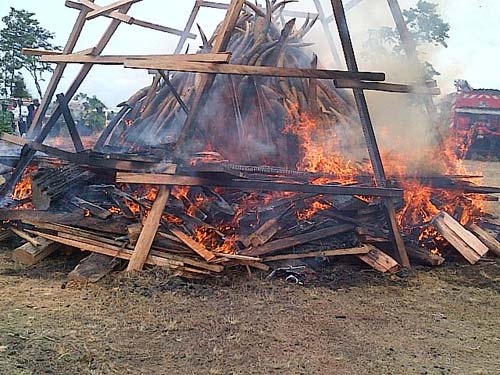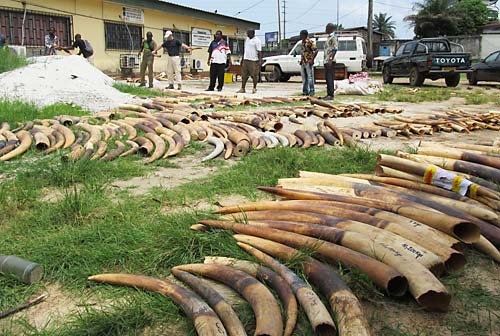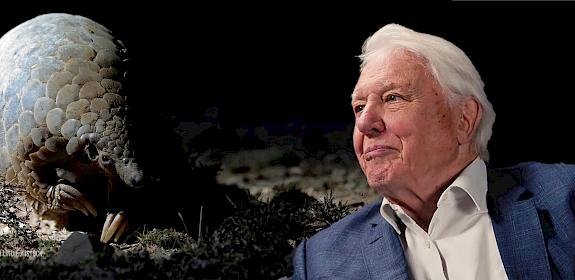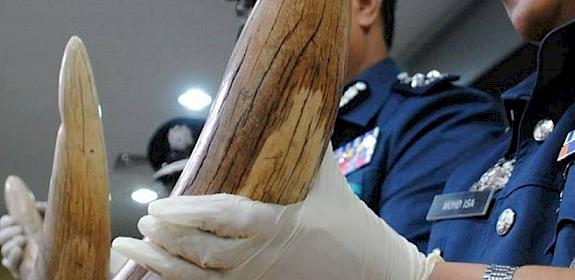Gabon set to burn thousands of ivory tusks and carvings
Libreville, Gabon, 27th June 2012 – In a bold move against poaching and illegal wildlife trade, Gabon is expected to burn its government-held ivory stockpile today. The decision comes at a time of intense poaching pressure in Central Africa, where the illegal killing of elephants for ivory is at record levels. Gabon’s President Ali Bongo will ignite the ivory pyre later today in Cité de la Démocratie.

WWF and TRAFFIC have worked with Gabon to independently audit its government-owned ivory stockpile before any is destroyed, to ensure that all tusks are accounted for and none has leaked into illegal trade.
“Gabon has a policy of zero tolerance for wildlife crime and we are putting in place the institutions and laws, to ensure this policy is enforced,” said President Ali Bongo.
The audited ivory stock totals 4,825 kilograms, including 1,293 pieces of rough ivory mainly composed of tusks and 17,730 pieces of worked ivory. The overall quantity of stockpiled ivory corresponds to roughly 850 dead elephants.
“WWF supports Gabon’s decision and sees the move as an indication of the country’s commitment to curbing elephant poaching and the illegal ivory trade,” said Stefanie Conrad, WWF Central Africa Regional Programme Office Representative. “Ivory of illegal or unknown origin cannot be sold legally internationally for commercial purposes. Gabon has acted commendably in deciding to put such ivory beyond use,” she said.
Gabon will be the first country in Central Africa to publicly destroy its ivory, and the burning of the government’s stockpile is intended to be a strong signal demonstrating the nation’s commitment to tackling the illegal wildlife trade.

A report issued last week by the UN body that regulates the international wildlife trade found that 2011 was the worst year on record for elephant poaching in Africa. It is estimated that tens of thousands of elephants are being killed across Africa each year for their tusks, which are in demand in Asia.
“This is an international problem and Gabon is coming under siege by criminal gangs of hunters and crime syndicates that smuggle ivory to Asia. Unless there is a strong international reaction to stop wildlife crime, and ivory smuggling in particular, the forests of Gabon will no longer vibrate with the rumble of the forest elephant,” said Professor Lee White, Executive Secretary of Agence Nationale des Parcs Nationaux (Gabon’s National Parks Agency).
“We need to break the illegal ivory trade chain,” said Suparna Biswas, Country Director of WWF-Gabon. “This time the decision has come from the top and should be an example to others. Many Central Africa ministries still proudly display pieces of worked ivory in their offices. Many government officials are implicated in illicit ivory trafficking. This must end.”
TRAFFIC’s data on ivory seizures show that record levels of illicit ivory were seized in 2011.
“If not managed properly, ivory stockpiles in the hands of government suddenly ‘get legs’ and move into illegal trade. Zambia lost 3 tonnes of ivory from the government’s strong room just last week and Mozambique lost 1.1 tonnes in February,” said Tom Milliken, TRAFFIC’s ivory trade expert. “Gabon’s actions effectively keep the ivory out of the way of temptation.”
Central Africa governments have joined together in search of ways to overcome this crisis by signing a regional plan to strengthen law enforcement and better combat poaching of elephants and other species at risk from illegal wildlife trade.
The report Audit des stocks gouvernementaux d’ivoire au Gabon. Rapport d’étape : 26 mars – 6 avril 2012 (in French with English summary) detailing the ivory stockpiles assessed during the audit carried out earlier this year.
Following a workshop, guidelines were also produced on an elephant ivory stockpile management system in Gabon: Développement d’un Système de Gestion des Stocks d’Ivoire au Gabon: Propositions de Standards Minimums (in French with English summary).




